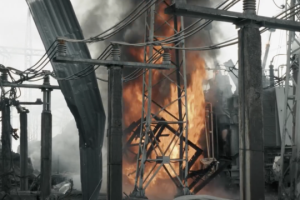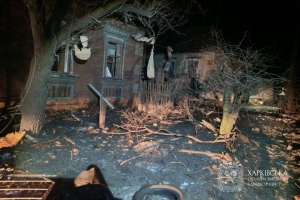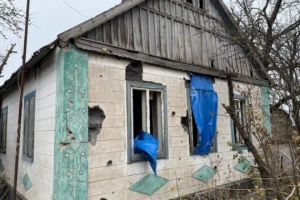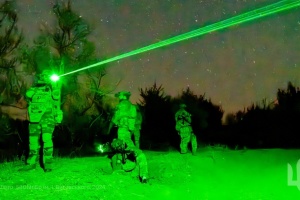
How Russians are trying to pacify occupied territories. Key propaganda messages
By imposing their information agenda on the occupied territories, Russians are betting on the lack of an alternative rather than on quality. Therefore, first of all, the Russian occupation administration closes access to alternative sources of television, radio, and print press, as well as blocks or tries to censor the Internet.
Similar censorship is in effect in Russia itself, where main media have long been “captured” by the Putin regime, the objectionable outlets are being closed or blocked by Roskomnadzor, or branded (as if forced to wear a David star patch) a “foreign agent.” After the start of an unprovoked (and poorly justified by the regime) full-scale aggression against Ukraine, the Kremlin is also trying to dispose of the remnants of free public opinion in its own country. To this end, amendments were made to the legislation, which allow prosecuting individuals for “compromising the army” and “spreading fakes news about its operations.”
The process of creating “media ghettos” in the temporarily occupied territories of Ukraine is accompanied by the destruction of traditional sources of information, starting with the removal and burning of books from public libraries and educational facilities and ending with the introduction of administration-controlled ISPs.
The occupiers act, obviously, guided by the Russian proverb “love comes with habit,” counting, if not on gratitude, then at least on the Stockholm syndrome of their victims. The invaders pay special attention to the younger generations, who are expected to be brought up in a spirit opposite to the civic beliefs and life experience of their parents.
The Center for Strategic Communication has studied the methods used by the ruscists in early November to instill the “Russian world” in the heads of the occupied population.
● Younger population is being engaged in all-Russian activities, with trips to Russia being organized, in particular, for “young athletes.”
● Art events are organized. To support the illusion of the normality of the invasion, they resort, in particular, to the services of actors who played in the Mariupol Theater, where on March 16, as a result of a Russian air strike, many city residents were killed. Now, the cast has gone on tour across cities of southern Russia under the brand of the Mariupol Theater.
● For integration, regional “cooperation” with neighboring regions of Russia is being implemented, with the engagement of Russian “civic” organizations.
● The message “Mariupol was destroyed not by us, but by nationalists” is being promoted. Children are being told that the Ukrainian Army is responsible for the shelling of the city.
● “Humanitarian charity” to locals is being promoted. For example, supply by the occupation administration of books and stationery to an educational facility is called “humanitarian aid,” while students are forced to line up, waving Russian flags, whenever a vehicle carrying such “aid” drives up to a school.
● Occupiers manipulate nostalgia of people whose youth fell on the times of the USSR, although such attempts to enchant Ukrainians with red flags, for example, on November 7, the Communist Revolution anniversary, look ridiculous.
● Occupiers try to instill a false ideology, stating, “Ukraine is about bad individualism, while Russia is about good collectivism. Russia means family values, not Western non-traditional views involving LGBT.”
● “The Russian army is destroying the Ukrainian army”: “The second-strongest army of the world” is still invincible in propaganda reports. The retreat from Kherson region is presented as a necessary preparation for further victories. Occasionally, fake news are being spread that “soldiers of the Polish regular army” are fighting on the part of Ukraine.
● It is claimed that POWs who return from Ukraine to the temporarily occupied regions allegedly suffered abuse in Ukrainian captivity and return sick. This mirrors the Ukrainian narrative about abuse and torture that POWs are subjected to in Russian captivity.
● “The Ukrainian authorities abandoned people, took all their belongings, and now Russia is helping” — the standard rhetoric of the occupiers.
● They are trying to show that Ukrainians are changing their attitude toward the Russians, saying that initially, some volunteered for the Armed Forces, then realized how things are, and now they are allegedly volunteering for the Russian army.
● They water down Russia’s responsibility, claiming that Ukraine is also guilty, also shifting the blame to the United States and claiming that the Russian Empire is an ideal to strive for.
Working with youngsters
Recently, a youth essay competition on the “future in Russia” was held in the occupied territories. The winners had a trip to Volgograd.
“Since October 26, representatives of the Zaporizhia region have been in Grozny of the Chechen Republic at training meetings,” the statement by the occupation administration reads.
Here are some of the news: “A boy from Skadovsk saved his friend, for which he was awarded in Moscow ‘For courage’ – making us very proud!”; “Students of the Berdiansk Music School took part in the All-Russian Festival ‘The Soul of the Bayan,’ which was held in Samara.”
The Putin regime hopes that establishing ties with Russia’s neighboring regions will help it take over the occupied territories. At the same time, it also tries to engage Russian “NGOs” in these efforts.
For example, the governor of Rostov region Vasily Golubev “suggested that Don NGOs expand interaction with colleagues from Novorossia”: “We have a huge amount of work ahead of us to strengthen social, political, and cultural ties with new subjects. And a special role here belongs to non-profit organizations.”
Art events
The tour of the Mariupol Theater is actively covered in the Russian media. It should be recalled that its building was bombed by Russian planes that killed hundreds in an underground shelter. For example, the AP investigation suggests that nearly 600 people died there.
From November 8 to November 20, the Grand Tours of the Mariupol Drama Theater will be held in the cities of Rostov-on-Don, Simferopol, Yalta, Sevastopol, and Krasnodar, the Russian media write.
The occupiers use some actors who played in the said theater as a propaganda tool to cover up the shame of their crime of destroying Mariupol.
“Unfortunately, some of the names are well known, told Mariupol journalist Maksym Hrabovskyi in a commentary for the Center for Strategic Communication. — They got together a few months ago and even arranged a photo shoot against the background of the destroyed Drama Theater. I wonder where Kozhevnikov is, the man who at first was director, and now, judging by everything, another man took this position. Probably, the occupiers put someone up from among their own. Unfortunately, the actors are really the same… Part of the theater crew left. Now they live in Uzhhorod, having already performed on stage locally. And those who stayed, as we can see, entertain the Russians on people’s bones.”
“I am grateful to all the art crows who stay in their workplaces. The cultural front is also a kind of war zone, where there is a fight for our children, for their free and happy future in peace and unity,” says Yevgeny Balitsky, a governor of Zaporizhia region.
“It was not us who destroyed Mariupol, nationalists did”
The ruins of Mariupol speak volumes about what Putinism is like. It is hard to stop thinking about the destroyed city. “Footage shows Mariupol and the story of how hard it can be to find the recipient among the wreckage and destroyed buildings. And there are still people living in these high-rise houses,” admit Russian Telegram channels.
Propaganda, of course, tells how Russia will restore everything and that the reconstruction has already begun. “[Paediatric surgeon] Alexander Smirnov admitted that Mariupol astounded him with the extent of the destruction, but at the same time, with the help of Russia, the city is actively recovering. Roads are being repaired and built here, new residential complexes are being constructed.” On TikTok, young bloggers film several restored houses from different angles, conveying the same message about reconstruction.
But the invaders are finding it increasingly hard to keep hiding who has in fact destroyed the city. New documentaries and testimonies of Russian crimes are emerging. For example, there is a film titled “Mariupol. Hope (Not) Lost.”
There is a prominent new wave of claims that it was actually Ukraine that destroyed the city. “A Mariupol resident told Vesti Tver about the atrocities committed by nationalists.” Telegram channels also shared videos with Ukrainian prisoners reading out the text about the killing of civilians. On November 3, the Mariupol 24 city TV channel started broadcasting in Mariupol.
RT Russia released a documentary, Mariupol, Russian City. How Mariupol Was Captured. It starts with the occupiers’ words that Ukrainian defenders were hiding behind civilians. This is followed by a clip made from interviews of local residents blaming the Armed Forces of Ukraine for everything.
In the comments, readers are convinced it was definitely Ukrainians committed these crimes. “Don’t Ukrainians on the other side see the truth, even through their families! They are so brainwashed!” Propaganda repeats the same thing that you hear in Ukraine, only the other way around.
One of the Russian information criminals, Artem Sheynin, a talk show host on the Russian Pervyy Kanal, who was directly involved in inciting international hatred, which led to the war, came to Mariupol and filmed a video at the wreckage of the Drama Theater. He provided “convincing arguments” that the explosives blew up from within, which means the theater was destroyed by the Azov Regiment. In fact, a 500-kilogram Russian aerial bomb, which is believed to have destroyed the theater, can easily penetrate the roof, so the explosion, of course, could have happened inside.
Throwing a humanitarian bone
“The Ukrainian authorities fled, taking ambulances along… They destroyed municipal equipment. And Russia was the first one who came to the rescue,” says Russia’s Gauleiter of the occupied part of Zaporizhia region Yevgeny Balitsky, sharing yet another message targeting the undemanding Russian audience.
This is accompanied by stories claiming that the occupiers feed children, for example, in the Lysychansk urban community. “We are being fed by the military, who protect us: servicemen of the allied forces not only protect the residents of Novodruzhesk, but also organized two hot meals a day for everyone in need,” says propaganda news.
Here is another “bone” they’ve thrown: “Kazan Federal University responded to the request and brought literature and stationery to Mariupol.” The children were lined up to meet Russian textbooks, carrying Russian flags.
Representatives of “United Russia” often tour the occupied territories, handing out instructions on what needs to be improved. There is now a regional branch of United Russia in Zaporizhia region. “Igor Kastyukevich, deputy head of the United Russia faction, arrived in Skadovsk to speak with the temporarily displaced persons and find out what issues they are having.”
“Ukrainians have changed their attitude toward the Russian army”
Propaganda tries to persuade its audience that people are giving up on Ukraine. “Former head of security of Zaporizhzhia NPP Oleksandr Dubinin, who used to raise funds for the Ukrainian army, has now sent heaters and rubber boots to Russian soldiers near Enerhodar,” reported military correspondent of RIA Novosti.
In the video, a man hands over items to Russian soldiers and says that he used to help Ukrainians, but he came under fire and realized that he was wrong: “I realized that they were shooting at their own residents from the other side… Against the background of shelling, people see that the Russian army really came to protect us from the Kyiv regime.”
“Ukraine tortures prisoners”
So-called “human rights commissioner in the LPR” Viktoriya Serdyukova made this comment about the exchange of war prisoners: ”As always, everyone suffered abuse, inhumane treatment, moral and psychological pressure, there was also torture and physical abuse. There are traces of torture and violence.”
Skadovsk in favor of groups, but against gays
“You lived here with the Ukrainian authorities, now you are with the Russian authorities. Can you tell me if there are any changes?” asks a propagandist in the street in Skadovsk, Kherson region.
“Of course, there are changes,” says the person who was likely asked to respond exactly that way. “People are starting to think that things are going back, that they will live as a group. That is, the time of individualism is ending. It will no longer be the case that every man is for himself. People are starting to remember how they lived under the Soviet Union. Well, not exactly like under the Soviet Union… But this ‘collectivity’ of ideas.” The interview also mentions that the residents of Skadovsk do not share Western values, in particular, “LGBT propaganda,” and Russia protected them from this.
Youths and red flags
Russia is trying to justify the annexation by nostalgia for childhood, youth and Soviet symbols.
Sometimes it feels like the word “cringeworthy” was invented exclusively to describe the future campaigns of Russian occupiers in Ukraine, which they hold on USSR-related occasions.
About the USSR, they say that you should “leave difficult pages in the past, and take everything good on board.” Propaganda generally tends to forget about criminal pages of history.
Sometimes, Telegram channels publish videos of incomplete buildings with a comment that the Ukrainian authorities are to blame for this decay — “the Ukraine we left.”
Silent retreat
The main message about the withdrawal of troops from Kherson is that they had to pull out for the sake of future victory.
Interestingly, as recently as November 7, Gauleiter Saldo insisted that “Kherson will stand strong.” But as usual, Russian propaganda is very different from reality.
After the retreat from Kherson, Russian propaganda is also trying to comfort the trusting part of the occupied population. The Russia-managed Typical Odesa channel published an audio address trying to justify Russia. They said there are two sides guilty of this war, both Russia and Ukraine. The war benefits the US. And Odesa should be regarded as a southern outpost of the Russian Empire currently captured by idiots. However, no matter how difficult it may be, they must keep this idea of Russia in their hearts…
After all the crimes committed by the Bolsheviks and the Chekists on behalf of Russia, including ones against today’s Odesa, this stance is hardly justifiable.
***
As we can see, the propaganda of Putin’s regime is actively trying to convert Ukrainians into Russians. But these lies may only seem convincing at the surface, especially when spread by armed, cruel invaders.
As for what happens when there is no more coercion, we could well see it in Kherson, whose residents had hoisted Ukrainian flags even before their liberators entered the city.
Center for Strategic Communication and Information Security




